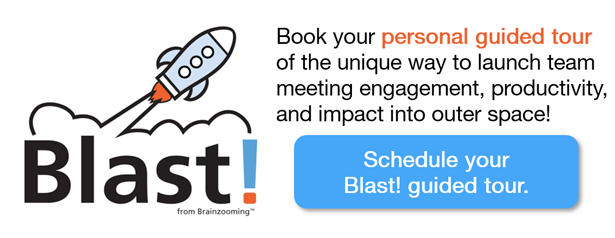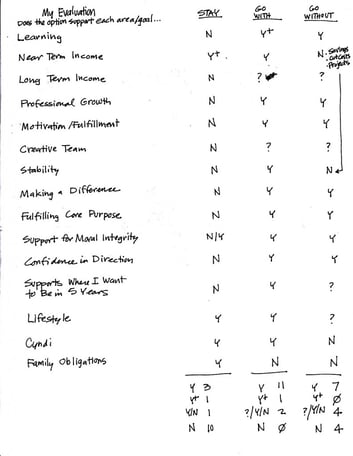I had fifteen minutes (although a senior executive’s big, “Hmphhh,” made me change it to twenty) to facilitate a leadership group through selecting the most important tactics to include in their strategic plan from among seventy-plus possibilities.
Anticipating their skepticism, I imagined analogies that might resonate with them for making selections. Tough selections. Selections that make you stand there, rocking back and forth on your feet. Filled with indecision. Picking that one thing, and then realizing you HAVE to have that other thing. Or, maybe THAT THING over there.
You know the feeling . . . picking the perfect donut.
That’s why I love analogies. They let you find a completely different situation that feels completely frivolous. Then, it turns into the bridge between apprehension and the core idea becoming incredibly clear.

Back to the story.
The donut analogy worked, coupled with placing all the tactics into our Blast! online collaboration platform to simplify the input process. Blast! made it so simple, in fact, that the senior executive who was concerned about fifteen minutes to complete the task?
She completed her input on priorities in ten minutes, as did most everyone.
Two Keys to Simplifying Strategic Choices
Two keys to simplifying choices, especially for strategic priorities?
- An easy-to-understand framework
- A simple way for people to participate
The Easy-to-Understand Framework
Here’s the donut prioritization framework, translating decision factors for those sweet baked goods to eight perspectives from which to prioritize, selectively include, or eliminate strategies.
Prioritize
- Elevate Major Initiatives: Highlight a couple of activities for significant focus.
- Preferences: Select activities that make sense for the organization given your senior leadership perspective.
- Visibility: High-profile activities that signal desired changes inside and outside the organization.
Selectively Include
- Popular Choices: Prioritize frequently mentioned opportunities that will receive broad support.
- Variety: Diverse activities that create progress on multiple fronts and demonstrate how the organization is moving forward.
- Experiment: A few activities that are less certain but are prototypes for future impact.
Eliminate
- Resource Restrictions: Defer activities that are too big to start now based on funding, time, or capabilities.
- Decide to Do Things Later: Something’s smart but can wait for later.
The Simple Way for People to Participate
As for the simple way to apply the framework, that’s the Blast! online collaboration platform.
Unless you’ve experienced Blast! (I’m happy to share a quick demo), it’s difficult to imagine a platform where:
- Everyone in your meeting can participate simultaneously
- Nobody has to worry about what anyone else will think of their bold responses
- The experience gets more productive as more people join the collaboration
- The time you spend in strategy meetings plummets by as much as 80%
- You can achieve a day’s worth of work in just 30 minutes
Think about completing a day-long meeting’s worth of work in 30 minutes? What’s the dollar value of the time savings and goodwill boost THAT would create for your team?
Take 30 minutes and find out with your very own Blast! demonstration. I’m waiting to unlock the possibilities for you! – Mike Brown



